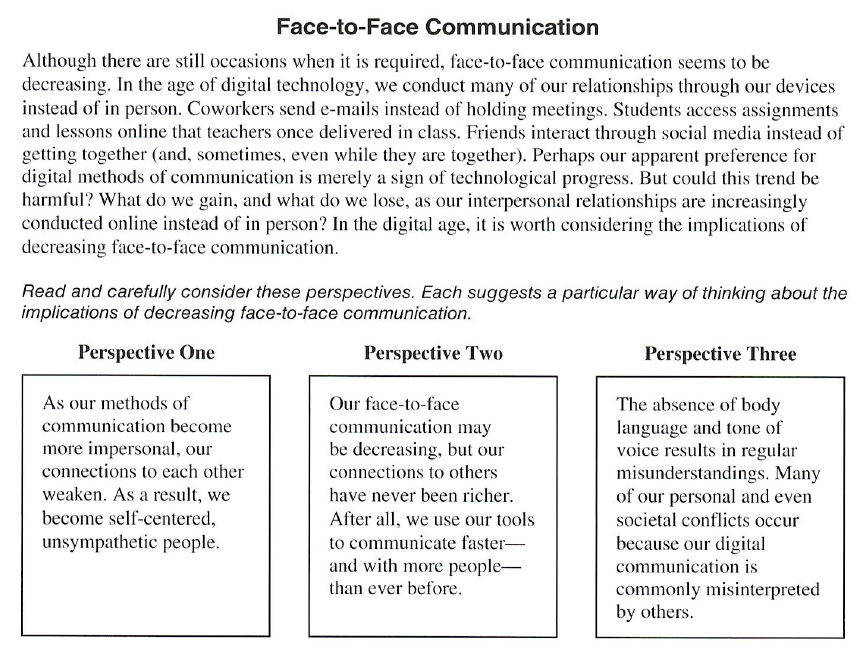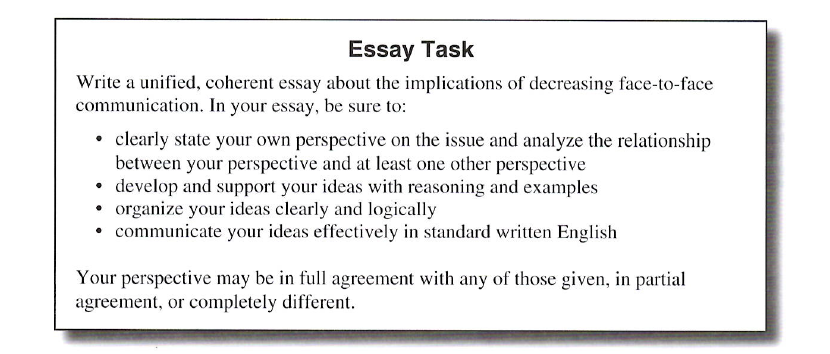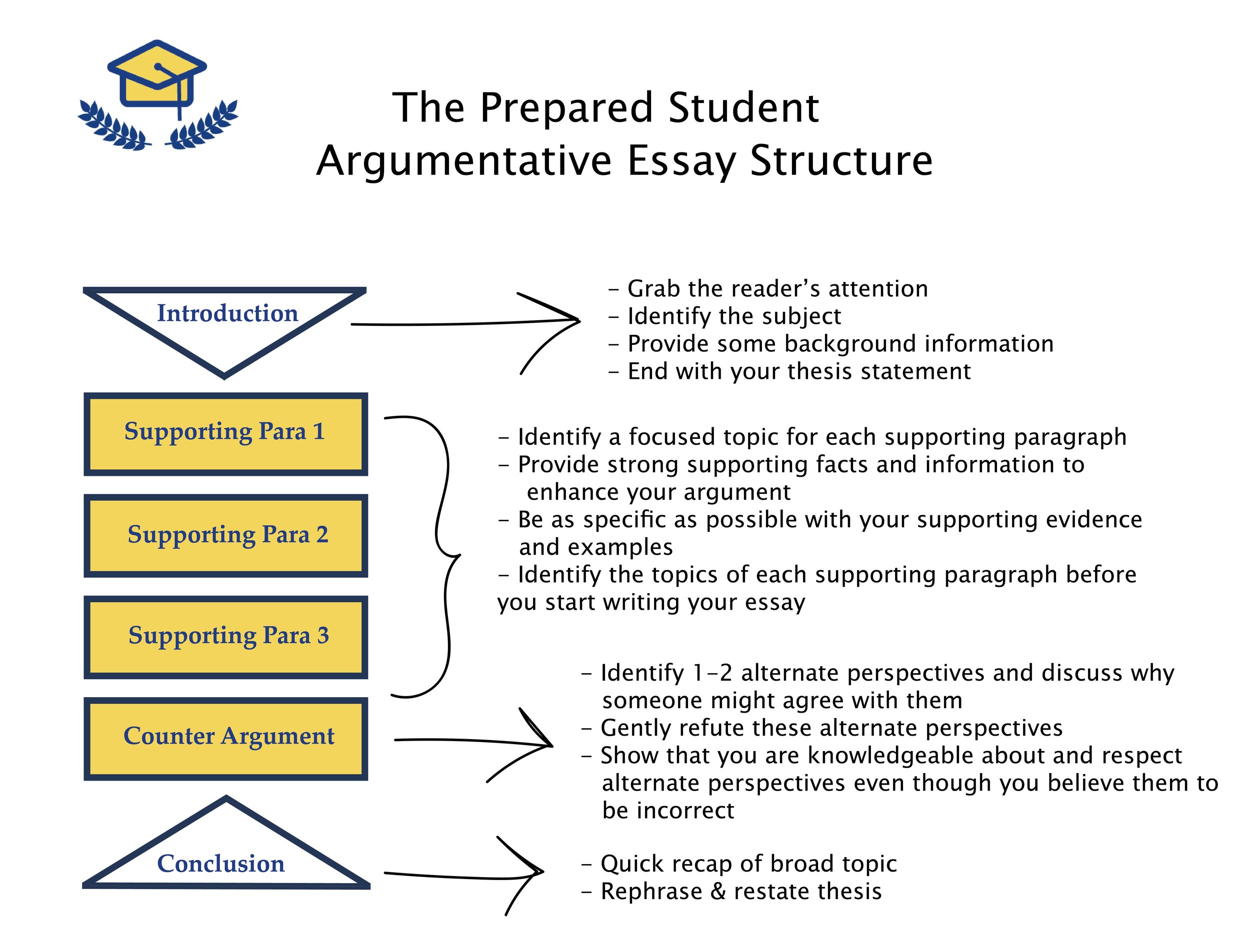ACT Writing Prep: How to Write an Argumentative Essay
Essay writing is an important skill for high schoolers to build to help them be successful in college. The ACT writing essay is just one of many essays that students will write during their high school years, and it’s a somewhat important essay. The ACT essay is always an argumentative essay that requires students to argue a perspective. Here are some things to keep in mind when crafting a strong argumentative essay.
What is an argumentative essay?
An argumentative essay requires students to argue opinions about a certain topic, focusing on arguing for a specific perspective. Basically, an argumentative essay poses an argument and tries to persuade readers to agree by using supporting facts and information.
Parts of an argumentative essay
Introduction
The introduction of any essay is very important for one reason: this is your first impression. You’ve probably had teachers tell you that you need to include a catchy hook in your introduction - this definitely isn’t a bad idea. You want to grab the reader’s attention and make them keep reading and paying attention. Your introduction should always close with your thesis statement.
Thesis Statement
A thesis statement is a concise, usually one-sentence, summary of the overarching point you’ll be making throughout the essay. If your essay is arguing that cats are better pets than dogs, then this is the type of broad information that you’ll want to include in your thesis statement. Make sure that the reader knows exactly what the broad topic of the paper will be.
Supporting paragraphs
This is where you’ll attempt to persuade the reader to believe your perspective. A rule of thumb for essay writing is that you want to try to have 3 supporting paragraphs. In these paragraphs, you’ll want to use concise facts and supporting information — the more specific the better! If you’re arguing that cats are better pets than dogs, you might have one supporting paragraph that focuses on the level of independence of cats, one that discusses the high intelligence level of cats, and a third that examines a cat’s lifespan. (These are just examples off the top of my head - there could be so many more reasons that cats are better than dogs, or why dogs are better than cats! Alas, you sadly will not see an essay prompt that looks anything as casual as this one test day…)
Counter argument/opposing viewpoints
A great argumentative essay will demonstrate an understanding of and respect for different viewpoints than one’s own. This is extremely important on the ACT — they want to see that you can argue a point, but they also want to see that you understand why someone may believe something different than you do. A good place to put this paragraph is right after your supporting paragraphs and before your conclusion. For my essay about cats and dogs, here is where I would write a brief paragraph discussing why some people prefer dogs over cats. I would then gently refute this perspective and lead into my conclusion.
Conclusion/recap
In your conclusion you want to offer a broad recap of your point. Restate your thesis using different wording, and wrap up the essay nicely by summarizing your entire point.
ACT Writing - what does it look like?
For the ACT writing section, the ACT will pick the topic for you. There aren’t multiple topics to pick from or anything like that — you get what you’re given. The ACT tries to pick topics that are somewhat relevant to modern society. Recently, they have done topics on face-to-face communication, childhood stardom, school start times, and gym class requirements in school. There will be a brief paragraph with some broad information on the topic, and this will be followed by 3 perspectives on the topic. This is what you can expect the essay prompt to look like on test day:
Then, you’ll be given the directions for writing your essay. They will look similar to this:
ACT Writing - How is it scored?
The scoring of the ACT writing section is a key difference from the other four sections of the exam. While all other sections are scored out of 36 total points, the ACT writing section is scored on a scale of 2-12. Since this is the only section of the test that is unable to be graded by a computer, the ACT has two separate evaluators read each student’s essay and give it a score on a scale of 1-6. These two scores are then combined to give the student a total score out of 12.
The fact that a human scores the writing section of the ACT can be a positive thing, as well as a negative thing. One downside has to do with the speed of scoring. Where a computer can quickly crank out Scantron test scores, humans take much longer to work through and score written essays. For this reason, ACT writing scores take about two weeks longer to be released than the multiple-choice counterparts of the same exam. On the positive side, a human has emotions and reactions and can be influenced by the essay that the student writes. This can be good to keep in mind while working through the writing essay. For example, data has shown that students who write more usually receive higher scores.
So, what are the evaluators looking for when they score an essay? Below are the four areas that the essays will be scored on. Here is the ACT’s identification of each of these categories. Per act.org, these areas are as follows:
Ideas and Analysis—Scores in this domain reflect the ability to generate productive ideas and engage critically with multiple perspectives on the given issue. Competent writers understand the issue they are invited to address, the purpose for writing, and the audience. They generate ideas that are relevant to the situation.
Development and Support—Scores in this domain reflect the ability to discuss ideas, offer rationale, and bolster an argument. Competent writers explain and explore their ideas, discuss implications, and illustrate through examples. They help the reader understand their thinking about the issue.
Organization—Scores in this domain reflect the ability to organize ideas with clarity and purpose. Organizational choices are integral to effective writing. Competent writers arrange their essay in a way that clearly shows the relationship between ideas, and they guide the reader through their discussion.
Language Use and Conventions—Scores in this domain reflect the ability to use written language to convey arguments with clarity. Competent writers make use of the conventions of grammar, syntax, word usage, and mechanics. They are also aware of their audience and adjust the style and tone of their writing to communicate effectively.
ACT Writing - What do I need to know to get a good score?
Lets begin by identifying what “good score” actually means. The ACT writing section is scored on a scale of 1-12, based on the sum of the scores given by the two evaluators. That means that if each scorer gives the essay a score of 3 out of 6, the student’s score will be 6 (3+3), so the student has an essay that is doing about half of what a perfect essay does. Per act.org, a perfect 6 out of 6 on each of the four areas is considered as follows:
Ideas and Analysis—The writer generates an argument that critically engages with multiple perspectives on the given issue. The argument’s thesis reflects nuance and precision in thought and purpose. The argument establishes and employs an insightful context for analysis of the issue and its perspectives. The analysis examines implications, complexities and tensions, and/or underlying values and assumptions.
Development and Support—Development of ideas and support for claims deepen insight and broaden context. An integrated line of skillful reasoning and illustration effectively conveys the significance of the argument. Qualifications and complications enrich and bolster ideas and analysis.
Organization—The response exhibits a skillful organizational strategy. The response is unified by a controlling idea or purpose, and a logical progression of ideas increases the effectiveness of the writer’s argument. Transitions between and within paragraphs strengthen the relationships among ideas.
Language Use and Conventions—The use of language enhances the argument. Word choice is skillful and precise. Sentence structures are consistently varied and clear. Stylistic and register choices, including voice and tone, are strategic and effective. While a few minor errors in grammar, usage, and mechanics may be present, they do not impede understanding.
This perfect score is hard to come by, however, since both scorers would have to give the essay a score of 6 out of 6. But don’t fret — you don’t need a perfect score! (Remember that this section is optional and does not count toward your composite score!) So what actually is a GOOD essay score? Well, the average writing score is just shy of a 7 out of 12. For students looking to go to rather competitive colleges and universities, it is a good idea to aim for at least an 8 on the ACT writing section — this lands somewhere in the 80+ percentile. Students scoring over 8 on the writing section are in the 95+ percentile for this section of the exam, which makes anything above an 8 a really great score.
ACT Essay Template
Notice that organization is one of the four areas that your essay will be scored on. For this reason, it’s very important to plan out your essay before you begin to write. Use this outline to help you understand how to organize your essay to make it flow nicely. Remember to always outline at least the topics of your supporting paragraphs before you start writing. This will ensure that you don’t have to spend precious time erasing and trying to move things around — remember the ACT essay is handwritten!
Recap: ACT Writing
While the ACT writing section may seem like a nuisance that wastes more of your Saturday morning and does not contribute to your composite ACT score, it can actually be very beneficial for students preparing to make the leap to college. The ACT writing essay evaluates a student’s ability to write essays effectively based on organization, ideas and analysis, development and support, and language use and conventions. Even if the writing section is not an admissions requirement for the specific schools that you plan to apply to, it might help you to gauge your writing abilities and thus determine how easy or difficult of a time college-level writing will be for you. Of course, there is much more preparation that can be done to ensure a student is ready to excel on the ACT writing section. If you want to refine your essay writing skills to make sure they are fitting for a high score on the ACT essay, one of our expert tutors would be happy to help you prepare. Reach out to us on our Contact page or by email at info@thepreparedstudent.com to discuss your ACT test goals and test prep needs.
Good luck, and happy prepping!
INTERESTED IN TUTORING OR COUNSELING WITH ABBY?
Working one-on-one with a test prep & college counseling expert can help you maximize your score on test day and get accepted to your dream school. Whatever your college prep goals, I can help!
I want more information! - Fill out the information in the link, and I will reach out soon.
I want to sign up! - Set up online lessons using the link to my scheduling system.





